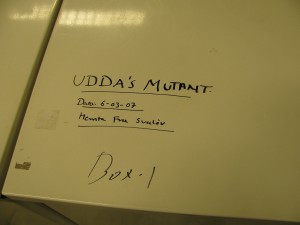Sometimes nature needs a little help. That was brought home to me in emphatic fashion last week as I listened to the formidable Udda Lundqvist summarize her more than half a century making and studying barley mutants. Some 10,000 barley mutants are conserved at NordGen. In this freezer, in fact:

And Udda described some of the main ones during her talk. You can see some of them, and read all about this work, in her 1992 thesis.
Useful mutations in barley include a wide range of economically important characters: disease resistance, low- and high-temperature tolerance, photo- and thermo-period adaptation, earliness, grain weight and -size, protein content, improved amino acid composition, good brewing properties, and improved straw morphology and anatomy in relation to superior lodging resistance.
Some of these have found their way into commercial varieties.
Through the joint work with several Swedish barley breeders (A. Hagberg, G. Persson, K. Wiklund) and other scientists at Svalöf, a rather large number of mutant varieties of two-row barley were registered as originals and commercially released (Gustafsson, 1969; Gustafsson et al., 1971). Some of them have been of distinct importance to Swedish barley cultivation. Two of these varieties, ‘Pallas’, a strawstiff, lodging resistant and high-yielding erectoides mutant, and ‘Mari’, an extremely early, photoperiod insensitive mutant barley, were produced directly by X-irradiation.
Udda is in her 80s but shows little sign of slowing down.
